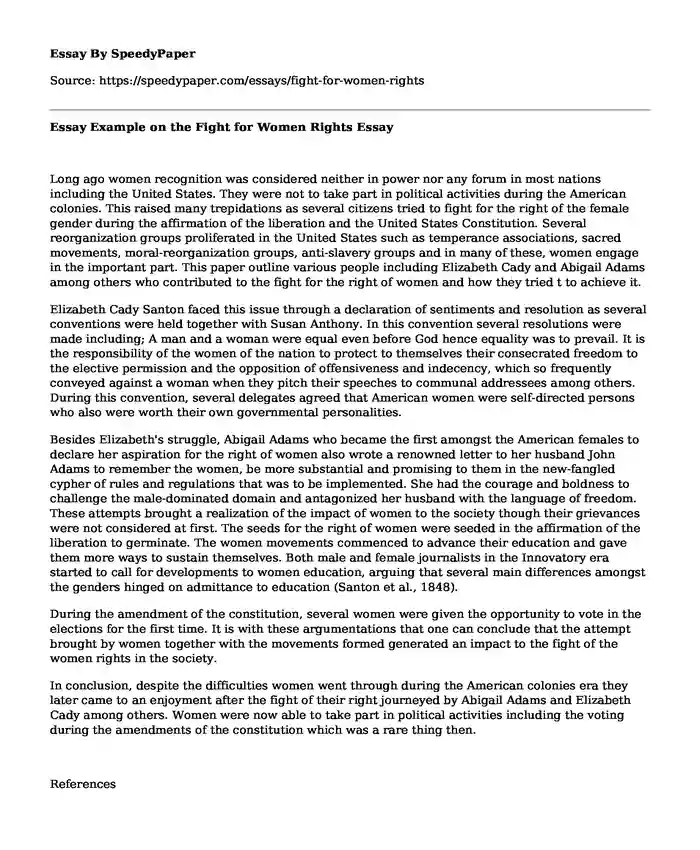Long ago women recognition was considered neither in power nor any forum in most nations including the United States. They were not to take part in political activities during the American colonies. This raised many trepidations as several citizens tried to fight for the right of the female gender during the affirmation of the liberation and the United States Constitution. Several reorganization groups proliferated in the United States such as temperance associations, sacred movements, moral-reorganization groups, anti-slavery groups and in many of these, women engage in the important part. This paper outline various people including Elizabeth Cady and Abigail Adams among others who contributed to the fight for the right of women and how they tried t to achieve it.
Elizabeth Cady Santon faced this issue through a declaration of sentiments and resolution as several conventions were held together with Susan Anthony. In this convention several resolutions were made including; A man and a woman were equal even before God hence equality was to prevail. It is the responsibility of the women of the nation to protect to themselves their consecrated freedom to the elective permission and the opposition of offensiveness and indecency, which so frequently conveyed against a woman when they pitch their speeches to communal addressees among others. During this convention, several delegates agreed that American women were self-directed persons who also were worth their own governmental personalities.
Besides Elizabeth's struggle, Abigail Adams who became the first amongst the American females to declare her aspiration for the right of women also wrote a renowned letter to her husband John Adams to remember the women, be more substantial and promising to them in the new-fangled cypher of rules and regulations that was to be implemented. She had the courage and boldness to challenge the male-dominated domain and antagonized her husband with the language of freedom. These attempts brought a realization of the impact of women to the society though their grievances were not considered at first. The seeds for the right of women were seeded in the affirmation of the liberation to germinate. The women movements commenced to advance their education and gave them more ways to sustain themselves. Both male and female journalists in the Innovatory era started to call for developments to women education, arguing that several main differences amongst the genders hinged on admittance to education (Santon et al., 1848).
During the amendment of the constitution, several women were given the opportunity to vote in the elections for the first time. It is with these argumentations that one can conclude that the attempt brought by women together with the movements formed generated an impact to the fight of the women rights in the society.
In conclusion, despite the difficulties women went through during the American colonies era they later came to an enjoyment after the fight of their right journeyed by Abigail Adams and Elizabeth Cady among others. Women were now able to take part in political activities including the voting during the amendments of the constitution which was a rare thing then.
References
Stanton, E. C. (1848). Declaration of sentiments and resolutions.
Remembering the ladies retrieved from https://www.feminist.com/resources/artspeech/remember/rtl4.htm
Cite this page
Essay Example on the Fight for Women Rights. (2022, Aug 26). Retrieved from https://speedypaper.com/essays/fight-for-women-rights
Request Removal
If you are the original author of this essay and no longer wish to have it published on the SpeedyPaper website, please click below to request its removal:
- Free Essay Sample on Accounting and Technology
- Essay Sample on Banyan Tree Holding
- Horror Genre in Filming, Free Essay for Every Student
- Free Essay in History of Religion with Articles Review
- Week 1: The Changing Nature of Work
- Essay Sample on Cultural and Historical Impact of Mona Lisa
- Essay Sample: Hosseini's Narrative
Popular categories





